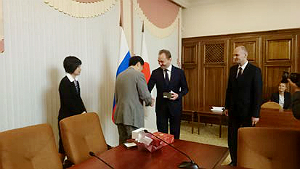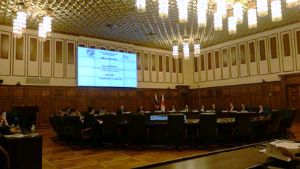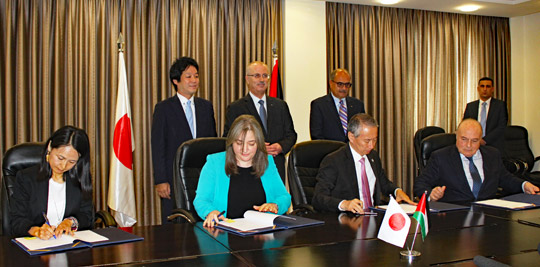Ministry of Economy, Trade and Industry [Thursday, Sep 8, 2016]
Fourth Japan-Russia Meeting Concerning SME Cooperation Held
On Monday, August 29, 2016, the Ministry of Economy, Trade and Industry (METI) and the Ministry of Economic Development of the Russian Federation held the Fourth Japan-Russia Meeting Concerning Small and Medium Enterprise (SME) Cooperation in Khabarovsk City, Russia. At the meeting, the sides exchanged views on inter-governmental cooperation in the field of SMEs. In addition, they held a historic first session organized by the private sector (private session) and conducted a business-matching event targeting companies from both countries.
1. Summary of the meeting outcomes
On Monday, August 29, 2016, METI and the Economy Ministry of Russia, held the Fourth Japan-Russia Meeting Concerning SME Cooperation in Khabarovsk City, Russia. At the meeting, both sides met in a private session as a new effort in addition to the existing government session, and conducted a business matching event for companies from Japan and Russia. METI expects to further advance the development of Japan-Russia business through such exchanges between Japanese and Russian SMEs.
1) Government session
Under the co-chairmanship of Mr. Yoichi Kimura, Commissioner’s Secretariat of the Small and Medium Enterprise Agency (SMEA) and Mr. Parshine, Director, Department of Small and Medium Enterprise Development and Competitiveness, the Economy Ministry of Russia, the sides exchanged views on bilateral measures for SMEs. In addition, on the Japanese side, the Japan External Trade Organization (JETRO) introduced its efforts encouraging overseas countries to invest in Japan and supporting Japanese companies in developing business overseas, and the Consulate-General of Japan in Khabarovsk explained its Japan-Russia cooperation activities in the Far East Russia and Eastern Siberia regions. On the Russian side, JSC Russian Small and Medium Business Corporation, The Russian Export Center, and the All-Russian Non-governmental Organization of Small and Medium Business (OPORA RUSSIA) introduced their own efforts. Following this, participants exchanged views on related issues.
2) Private session
A private session was also held at the meeting, representing the first effort co-organized by JETRO and The Russian Export Center. The session brought together Japanese companies, including machinery manufacturers in the timber processing industry and importers and exporters in greenhouse-grown products and agricultural products industries, focusing on the fields in which the Russian side is interested. Employing a roundtable format, participating companies first explained their own efforts and exchanged views with other participants. Following this, a company-based business matching event was held.
2. Visits to Russian companies
On Tuesday, August 30, 2016, the participating Japanese machinery manufactures in the timber processing industry visited the Far East Advanced Wood Processing Center in Amursk City to study the current states of the timber processing industry in Russia. Furthermore, participating Japanese companies in the agricultural products industries visited a vegetable plant called “MIRAI,” a facility in which Japanese technologies have been installed, a greenhouse cultivation facility called “JGC Evergreen,” the development of which was led by a Japanese company, and a large-scale supermarket called “Samberry.”
Reference: Outline of the Japan-Russia Meeting Concerning SME Cooperation
Under the Memorandum of Cooperation on Small and Medium Enterprises concluded by METI and the Economy Ministry of Russia in December 2013, three “Japan-Russia Meetings Concerning SME Cooperation” were held to facilitate cooperation in the sharing of SME policies and vitalizing SMEs. The first meeting was held in Tokyo in March 2014, the second one in Ulyanovs, Russia, in December 2014, and the third one in Tokyo in June 2015.
 Commissioner’s Secretariat Kimura and Director Parshine
Commissioner’s Secretariat Kimura and Director Parshine  The meeting
The meeting
Japan International Cooperation Agency [Wednesday, Sep 7, 2016]
Signing of Grant Agreement with the Palestinian Authority: Protecting a cultural property while promoting tourism through the construction of protective facilities for Hisham’s Palace in Jericho
On September 6, the Japan International Cooperation Agency (JICA) signed a grant agreement (G/A) with the Palestinian Authority in Ramallah, to provide grant aid of up to 1.235 billion yen for the Project for the Construction of the Protective Shelter and the Presentation of the Great Bath at Hisham’s Palace, Jericho.
Hisham’s Palace is a cultural property representative of early Islamic architecture and a tourism resource in Jericho, and this project will construct facilities to both protect the archaeological site and promote tourism.
There are many cultural properties that are potential tourism resources in the Palestinian Territories, but due to a lack of funds and personnel necessary to prepare and protect them, they are underutilized as tourism resources.
Among them, the site of Hisham’s Palace is a cultural property representative of early Islamic architecture from the Umayyad dynasty (eighth century) and attracts many tourists domestically and from abroad. Said to have one of the largest bathhouse mosaic floors in the Middle East, at approximately 825 square meters in size, the site cannot be fully appreciated due to protective carpeting and sand that cover the floor.
With the increasing number of visitors to the site in recent years, however, there have been incidents where the sand has been swept away without permission to view the mosaic floor, making the development of facilities to protect the historically valuable mosaic floor from deterioration and damage a priority. At the same time, there is a need to provide facilities that will make it possible to appreciate the mosaic floor and enhance the value of Hisham’s Palace as a tourism resource to attract more visitors.
This project will construct facilities to protect the valuable mosaic floor and provide technical guidance to appropriately preserve it.
By protecting the historical cultural property while allowing public access to it, this project is expected to promote sustainable economic growth with the promotion of tourism.
